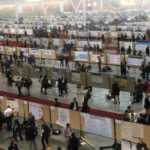Clinician members will have more than enough sessions to keep them busy at the ACR Annual Scientific Meeting in Boston this November. The Annual Meeting Planning Committee (AMPC) continues to use attendee feedback and member input to create a meeting that offers vital content to every attendee.
“The goal of all the program changes is to create a meeting that has something in virtually every timeslot for all constituents of the ACR. For example, we tried to provide more choices for folks who have special interests, such as pure clinical medicine or basic science,” reflects Brian Mandell, MD, PhD, chair of the AMPC. “We realize that this will create dilemmas of too many choices for some people, but our philosophy is to offer more choices rather than fewer.”
New Sessions, New Schedules, More Choices
For the first time, the ACR will recorded some clinical sessions that run in opposition to similar topics and replay them the following day in the Encore Theater. A listing of these sessions will be available at the meeting.
Also, topics relevant to clinicians, which in the past might have been offered as part of the Frontiers in Translational Research preconference, will now be incorporated into other sessions at the meeting.
Another first this year is that additional programming will be offered at the same time as two of the morning plenary sessions. This decision, though controversial, was made in response to attendee feedback. “The plenary sessions are typically strong basic science,” explains Dr. Mandell. “That’s an important part of the meeting, but some of the clinicians felt that wasn’t the best use of their time and asked for relevant clinical sessions. The alternatives we provided are meant to do that.”
“Curbside Consults – Ask the Professors” is one alternative session. This session is the equivalent of an elevator consultation with speakers who have a particular area of expertise. “We’re posing a question in advance that they might otherwise get in a typical quick consult, and in the session we’ll offer a short clinical case scenario and ask the expert speakers how they’d respond to the clinical problem,” says Dr. Mandell. Another innovation will allow attendees to participate in the session. “We are planning on introducing use of an interactive audience response system into some sessions at the meeting,” he says.
Other new sessions include “Rheumatology Roundup,” which will offer highlights from the 2007 ACR Annual Scientific Meeting rather than from the year at large. At the session, leaders in the field will comment on abstracts presented during the annual meeting.
Another session will recognize the Arthritis & Rheumatism 50-year anniversary. At this session, former editors and current scientists will provide their perspective on the evolution of current clinical concepts, the role of Arthritis & Rheumatism in that evolution, and the future of rheumatology publications.


